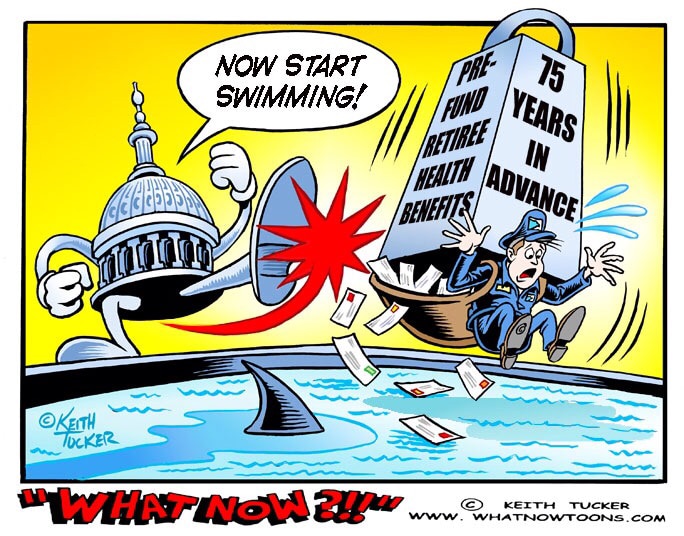
President George W. Bush signs H.R. 6407, the Postal Accountability and Enhancement Act, Wednesday, Dec. 20, 2006, at the Eisenhower Executive Office Building in Washington, D.C., joined by, from left to right, Postmaster General Jack Potter, Sen. Thomas Carper of Delaware, James C. Miller III, Chairman of the Postal Service Board of Governors; Rep. Tom Davis of Virginia, Sen. Susan Collins of Maine, Rep. Danny Davis of Illinois and Rep. John McHugh of New York. White House photo by Eric Draper
The member of Congress who wrote the 2006 law that has been widely blamed for the United States Postal Service’s financial crisis is defending that act but warning that lawmakers are unlikely to come quickly to the agency’s rescue.
Former House Committee on Government Reform chairman Tom Davis laid that forecast before a July 16 Pew Charitable Trust seminar on whether banking services should be offered by the USPS.
Now a lobbyist for the consulting firm of Deloitte LLP, Davis told the daylong meeting that the Postal Service “is still very savable” and could be quickly rescued by Congress.
But Davis also argued that the Postal Service is essentially powerless in Washington, D.C., and that most officials tend to ignore its calls for help.
“My judgment is until the postmaster general goes and starts making some tough decisions and Congress feels the pain for not acting, they’re not going to act.”
A former Republican legislator from the northern Virginia suburbs, Davis seemed to be praising the agency’s current plans for closing 82 mail-processing plants.
His talk offered a revealing look at how little clout the Postal Service has with a Congress that is wooed by countless mailing groups with political action committees.
He recounted how difficult it was for him and Rep. Henry Waxman, D-Calif., to get the Bush White House to pay attention to Postal Service’s issues in 2006.
In response to a question, Davis acknowledged that the White House then had insisted on making the Postal Service pre-fund the costs of its retiree health plans as part of his legislation.
That, he said, was an action designed to ensure that the legislation received a positive financial score from the Congressional Budget Office, and was not designed to ruin the agency’s finances, as some have charged.
The 2006 law “would have been fine had we not had the recession” of 2008 that caused a major drop in mail volume, Davis said.
Asking if he would buy the Postal Service, Davis said ,“Yes, if it did have the constraints on it … absolutely.”
“There is still something there, but it’s got to be right-sized,” the former lawmaker said.
House Committee on Oversight and Government Reform chairman Darrell Issa, R-Calif., a champion for shrinking the Postal Service who runs the same panel that Davis did from 2003 to 2007, also spoke at the Pew seminar.
“We can fix the post office,” he sought to assure his audience.
“But don’t assume that if we add a new function we can add anything to the bottom line,” he said, dismissing the idea of Sen. Elizabeth Warren, D-Mass., to add banking to the Postal Service’s functions.
Warren also appeared before the Pew audience, seeking to win support for what she said would be a logical service to the nation’s “unbanked.”
Issa, whose committee would have to approve the idea, made clear that he would fight her idea. It would be far better, he said, to create a new entity to handle such a job because postal workers were not qualified to do it.
Calling the USPS “an $8 billion sinkhole,” he said it does a good job at delivering mail but has an aging unionized work force that is “resistant to change.”
Issa’s comments about postal employees were rejected by a American Postal Workers Union official on a later panel during the day.
Postal labor unions, one of the influential Washington lobbying groups cited by Davis, are already opposing Issa’s plans for the USPS.
Davis had said that the USPS, an independent federal agency, is basically powerless against its well organized mailers, unions and competitors.
“It really has no political pull at all by itself,” the former lawmaker said.
“The employees … unions … they can organize at the drop of a dime. First-class mailers, bulk rate mailers, newspapers. FedEx and UPS are very well trained.
“For the post office, it’s just not a fair fight,” Davis said.
“… Almost any one single group can stop it.”


